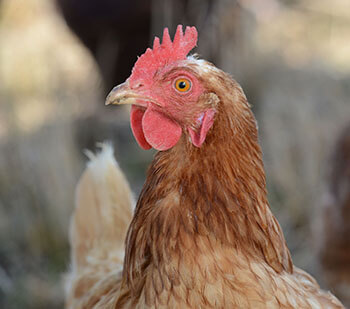Caring for Your Chickens During the Heat of Summer
Jul 22, 2019

As summer rolls on, it’s important to maintain your chickens’ health and comfort. The sticky summer heat can be harmful to your feathered friends. Chickens have a natural layer of thick insulation thanks to their feathers. While this can be beneficial during the winter months, flocks can easily become stressed due to heat.
If you are concerned about heat stress in your birds, watch for signs that they’re becoming overheated. Signs of heat stress include: panting, a decrease in appetite, pale combs, diarrhea, and seizures.
A simple way to combat heat stress is to ensure your birds have access to fresh, cool water. When hot, chickens will drink up to twice the typical amount of water so make sure there is plenty available!
Chickens will also seek out shady areas when temperatures rise, so providing a covered area to rest can aid in cooling down. Installing evaporative cooling systems such as a fan or fogger can help keep their roosts ventilated and drive off excess heat. In addition, offering a natural dust bath in the form of an old tire or similar container filled with dirt can help cut down on boredom as well as keep their skin cool.
Nutrition is as important as ever during the summer months! Co-op recommends implementing our Natural Layer Pellet (#119PE) or Natural Layer Crumble (#116CR) into your flock’s diet in order to maintain optimum nutrition.
In addition, many Co-op stores sell a variety of oyster pellet products. Ground oyster shells can be beneficial to laying hens and other birds as it provides an additional source of calcium and can help hens maintain a stable body temperature.
If you are concerned about heat stress in your birds, watch for signs that they’re becoming overheated. Signs of heat stress include: panting, a decrease in appetite, pale combs, diarrhea, and seizures.
A simple way to combat heat stress is to ensure your birds have access to fresh, cool water. When hot, chickens will drink up to twice the typical amount of water so make sure there is plenty available!
Chickens will also seek out shady areas when temperatures rise, so providing a covered area to rest can aid in cooling down. Installing evaporative cooling systems such as a fan or fogger can help keep their roosts ventilated and drive off excess heat. In addition, offering a natural dust bath in the form of an old tire or similar container filled with dirt can help cut down on boredom as well as keep their skin cool.
Nutrition is as important as ever during the summer months! Co-op recommends implementing our Natural Layer Pellet (#119PE) or Natural Layer Crumble (#116CR) into your flock’s diet in order to maintain optimum nutrition.
In addition, many Co-op stores sell a variety of oyster pellet products. Ground oyster shells can be beneficial to laying hens and other birds as it provides an additional source of calcium and can help hens maintain a stable body temperature.